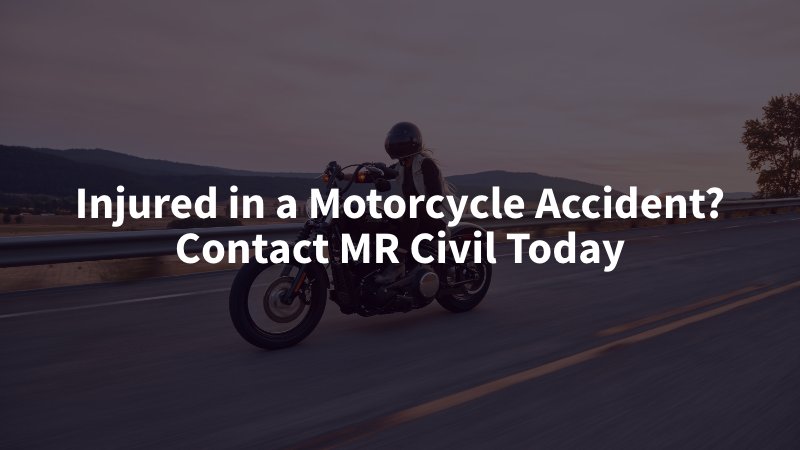Motorcycle accidents frequently result in serious or fatal injuries due to a lack of protection. In fact, a staggering 80% of motorcycle accidents result in injury or death, compared to only 20% of car accidents. Motorcyclists lack the protective shell that car and truck drivers have, making them especially vulnerable to death or serious injury in a crash.
Even a low-speed collision can result in life-threatening injuries – the same accident in a car might bend a fender. Drivers frequently fail to notice or are unaware of the presence of motorcyclists, which has disastrous consequences.
If you or someone you love has been in a motorcycle accident in Dallas, you should not waste any time before retaining the services of a skilled personal injury lawyer. Every type of accident can lead to serious and catastrophic injuries, but motorcycle collisions are especially devastating. At Mathias Raphael PLLC Accident & Injury Lawyers, our Dallas motorcycle accident lawyer who is familiar with all aspects of motorcycle injuries can assist someone who has been injured in a motorcycle accident in receiving compensation. Contact us today for your free consultation.
Without the protection of a passenger vehicle, motorcyclists are exposed to the full impact of any collision they find themselves in. Additionally, the small size of their vehicle makes motorcyclists difficult for other drivers to see. All too often, a driver negligently fails to check their blind spot and causes a devastating accident.
Even without other drivers posing a constant danger, motorcycles are less stable than cars and trucks with 4 wheels. If road or weather conditions are off, motorcyclists can be seriously injured.
Below are more reasons why motorcyclists are especially prone to accidents:
Other factors that can cause or contribute to a Dallas motorcycle accident include:
While inexperienced motorcyclists or bikers who ride aggressively or irresponsibly can cause accidents, many multi-vehicle motorcycle accidents are caused by the negligence (or carelessness) of other drivers.
Negligence by other drivers may include:

Per mile driven, motorcyclists and their passengers are 27 times more likely to die in a crash than passenger vehicle occupants. In 2018, a total of 4,985 motorcyclists lost their lives to traffic accidents. Although motorcycle fatalities are steadily declining, motorcyclists are still overrepresented in fatal collisions.
Further, the statistics above only represent the accidents in which motorcyclists die. The percentage of motorcycle riders who crash is not a measurable statistic because not all motorcycle accidents are reported to the safety agencies that track stats. Most motorcyclists will tell you, however, that almost everyone they know has been in some sort of crash.
The most common motorcycle accident injury is damage to the lower extremities, but injuries to the chest and head are also common. According to the National Highway Traffic Safety Administration (NHTSA), bone fractures in the legs are common after a motorcycle accident. The NHTSA also notes that, despite being more common, head and chest injuries were typically more severe.
Any motorcycle crash can result in serious injuries, such as:
To prevent some of the more severe injuries on this list, we recommend you wear a helmet whenever you ride a motorcycle. In some states, the law mandates helmet use, so you could even jeopardize your personal injury case or insurance claim by not wearing a helmet! Learn more in the next section.
In Texas, all riders under the age of 21 are required to wear a helmet when operating a motorcycle. Adult riders who are over 21 may choose to ride without a helmet, but only if they have completed a safety course or have the correct insurance plan.
Nevertheless, the Texas Department of Transportation encourages all motorcyclists to wear a helmet and other protective gear, ride defensively, and take a course to learn or reinforce safe riding techniques.
All motorcyclists in Texas are also required to carry a Class M motorcycle driver’s license.
Because riding without a helmet is legal for adults in Texas, you may still be entitled to compensation if you are harmed while riding without one. Similarly, a lack of helmet use will not justify a fatality in a wrongful death case.
Compensation for an injured motorcyclist from a successful personal injury claim is classified into three types: economic, non-economic, and punitive.
Economic Damages are compensation provided for losses suffered by a motorcyclist that can be quantified. Following a crash, a motorcyclist may be able to recover economic damages such as:
As any motorcyclist who has been in an accident knows, the injuries sustained in a motorcycle accident go far beyond monetary value. Although no one can put a monetary value on the pain and suffering endured by a motorcyclist both during and after an accident, a personal injury claim does provide some monetary compensation for “non-economic” damages incurred in a motorcycle accident, such as:
Punitive damages are intended to punish the defendant and deter future similar behavior, not to compensate you for your injuries. Punitive damages are typically awarded only in cases involving reckless or intentional behavior. Someone who was a victim of drag racing or under the influence of alcohol or drugs at the time of the loss, for example, may be eligible for punitive damages.
Mathias Raphael PLLC Accident & Injury Lawyers is home to compassionate and experienced Dallas personal injury lawyers. We will fight tirelessly for you until the best outcome has been secured. If you are offered an insufficient settlement, we will not hesitate to go to trial on your behalf, especially in cases inspired by devastating motorcycle crashes.
"◆" indicates required fields